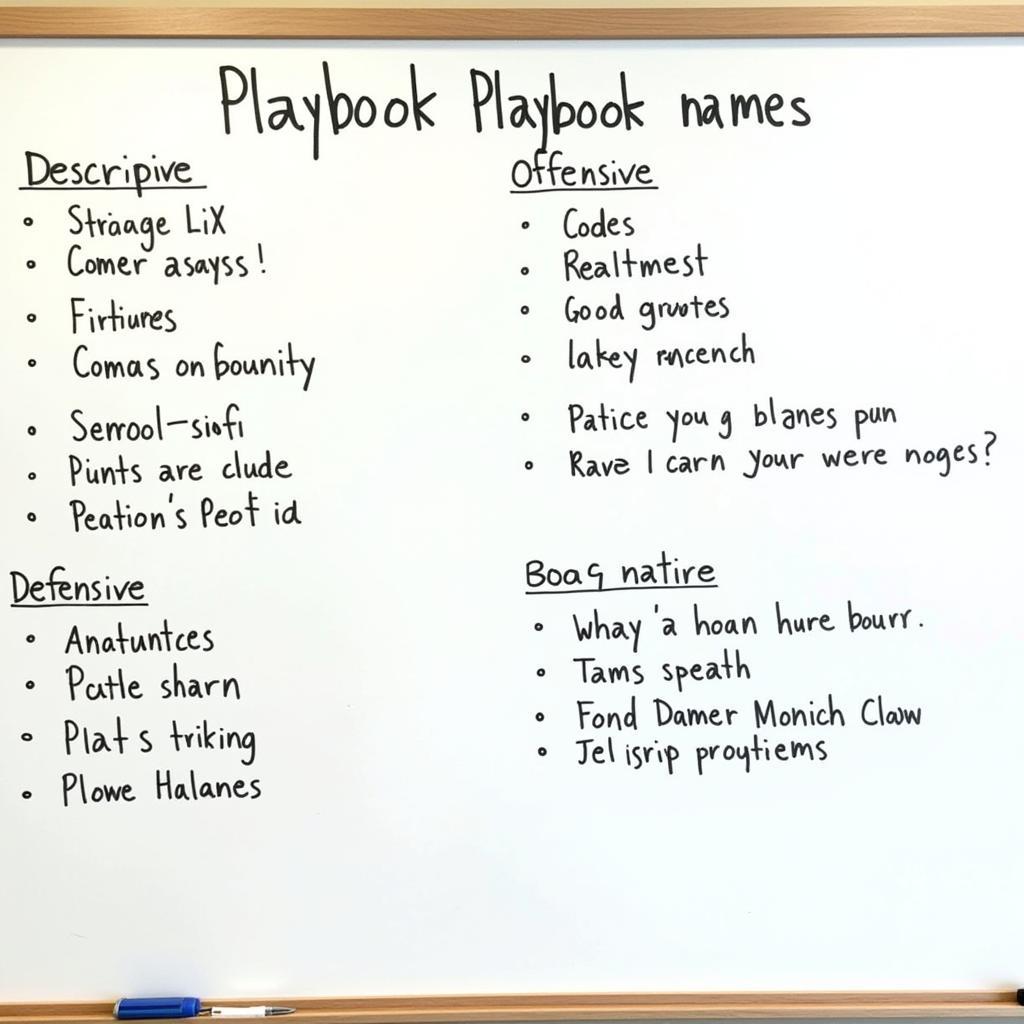Playbook Names are more than just labels; they’re a crucial part of football strategy, communication, and team culture. Whether you’re coaching a professional team or playing a video game like NCAA 14, choosing the right playbook names can improve organization, speed up play-calling, and even add a touch of fun and personality to the game. This article dives deep into the art of crafting impactful playbook names, covering everything from understanding your team’s style to optimizing for specific game situations.
Choosing effective playbook names requires a deep understanding of your team’s strengths and weaknesses. Are you a run-heavy team? Does your quarterback excel at short passes or deep bombs? Tailoring your names to reflect your team’s identity can make communication smoother and faster. For example, a running play designed to exploit the left side of the field might be called “Left Hammer” or “Crusher Left.”
Types of Playbook Names and Their Uses
Playbook names can be categorized based on their function and style. Some common types include:
-
Descriptive Names: These names clearly indicate the play’s action, such as “Power Run Right” or “Screen Pass Left.” These are especially useful for beginners or teams that prioritize clear communication over secrecy.
-
Coded Names: Coded names use seemingly random words or phrases that conceal the play’s true nature from the opponent. Think “Blue Sky,” “Red Dawn,” or “Green Lantern.” This requires a well-drilled team that can memorize the meaning behind each code.
-
Location-Based Names: These names incorporate geographic locations, like “Texas Sweep” or “California Blitz,” which can be helpful for remembering specific formations or assignments.
-
Humorous Names: Injecting humor into your playbook can boost team morale and make the game more enjoyable. “Fat Man Wobble” or “The Flying Squirrel” are just a few examples that can add some levity to the game plan.
If you’re looking for inspiration for team names, the college football team name generator might give you some ideas to spark your creativity.
 Examples of Effective Playbook Names
Examples of Effective Playbook Names
How to Name Football Plays Effectively
Creating effective playbook names is a process. Consider these steps:
- Analyze Your Team: Understand your team’s strengths, weaknesses, and overall playing style.
- Categorize Plays: Group similar plays together based on formation, objective, or personnel involved.
- Choose a Naming Convention: Decide on a style (descriptive, coded, etc.) that best suits your team’s needs.
- Keep it Concise: Short, easily remembered names are essential for quick communication on the field. Avoid overly long or complicated names.
- Be Consistent: Stick to your chosen naming convention throughout your playbook to avoid confusion.
You can find more in-depth information on this topic at how to name football plays. This resource can provide valuable insights and strategies for developing a comprehensive naming system for your playbook.
Playbook Names in Video Games
Video games like NCAA 14 offer a unique platform to experiment with playbook names. While the core principles of effective naming still apply, the virtual environment allows for more creativity. Consider referencing popular culture, inside jokes, or even the names of your favorite players. Adding ncaa 14 dlc can further enhance your gaming experience. Perhaps you’ve always wanted to run the “Philly Special” – now you can customize it with your own unique twist.
John Madden, a legendary football coach and commentator, once said, “Winning is not everything, but the will to prepare to win is everything.” Choosing the right playbook names is a small but important part of that preparation.
Bill Belichick, another highly successful coach, emphasizes the importance of simplicity and clarity in communication. “Do your job,” is a mantra that extends to playbook naming. A clear, concise name ensures everyone knows their role.
Playbook Names for Different Formations
Different formations often call for different naming conventions. For instance, a “Wishbone” formation might utilize names like “Triple Option Left” or “Wishbone Dive.” Similarly, a “Spread Offense” might use names like “Four Verticals” or “Mesh Concept.” Tailoring your names to the specific formation helps players quickly visualize the play’s structure. Want to know more about football formations and strategies? Check out this central michigan university football depth chart.
Have you thought about customizing your locker with custom locker magnets? It could be another fun way to express your team spirit.
In conclusion, playbook names are a vital component of football strategy, both on the field and in the virtual world. By carefully crafting names that reflect your team’s identity, style of play, and specific game situations, you can significantly enhance communication, improve execution, and add a touch of personality to your game. Whether you’re aiming for descriptive clarity or coded secrecy, remember that the ultimate goal is to create a system that empowers your team to perform at its best.
FAQ
- What are some examples of creative playbook names?
- How do I choose the right naming convention for my team?
- Are coded playbook names more effective than descriptive names?
- How can I incorporate humor into my playbook names without sacrificing clarity?
- What are some tips for creating memorable playbook names?
- How can I adapt my playbook naming strategy for different game situations?
- Are there any resources available for generating playbook names?
For further assistance, please contact us at Phone Number: 0902476650, Email: [email protected] Or visit us at: 139 Đ. Võ Văn Kiệt, Hoà Long, Bà Rịa, Bà Rịa – Vũng Tàu, Việt Nam. We have a 24/7 customer support team.





